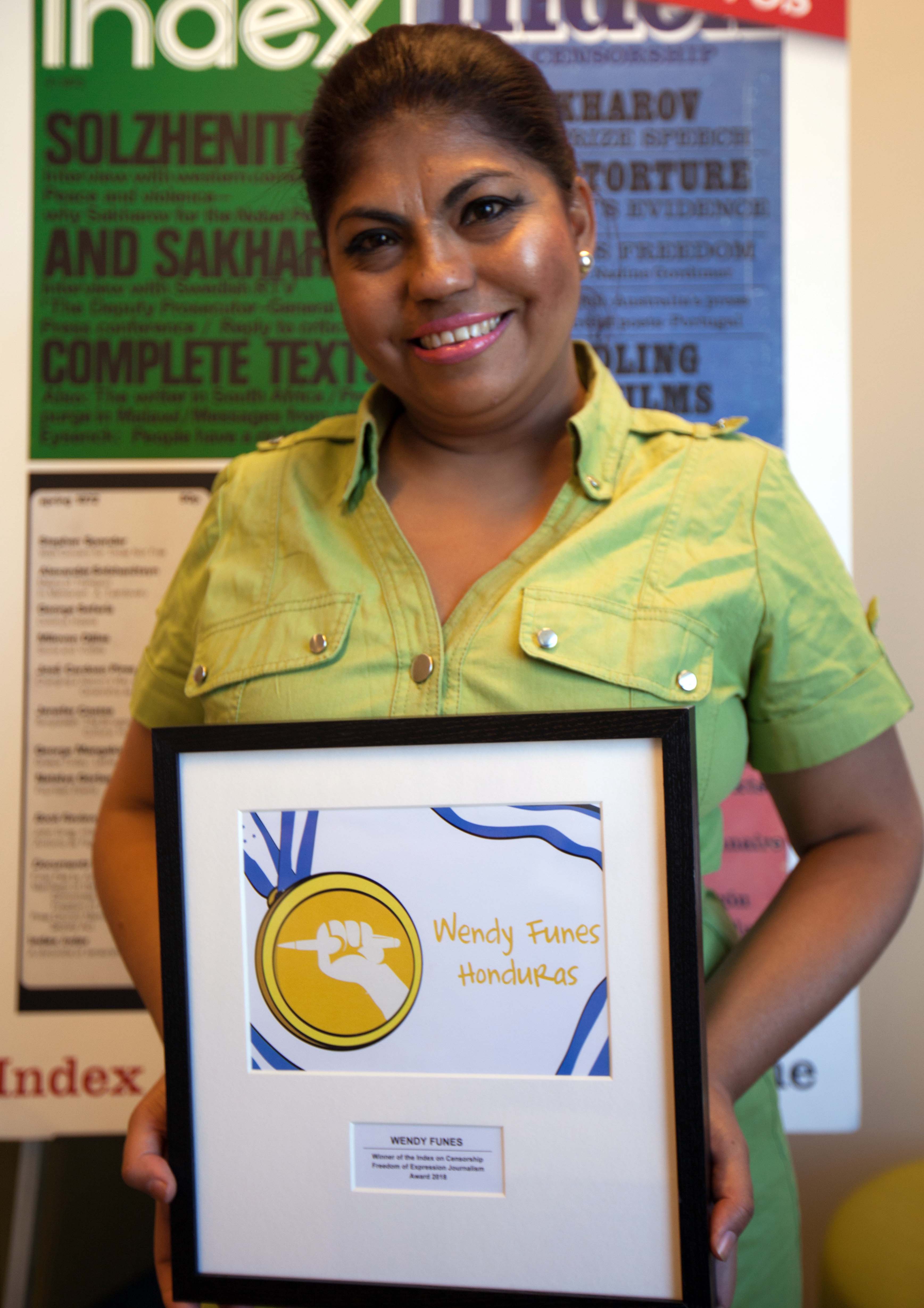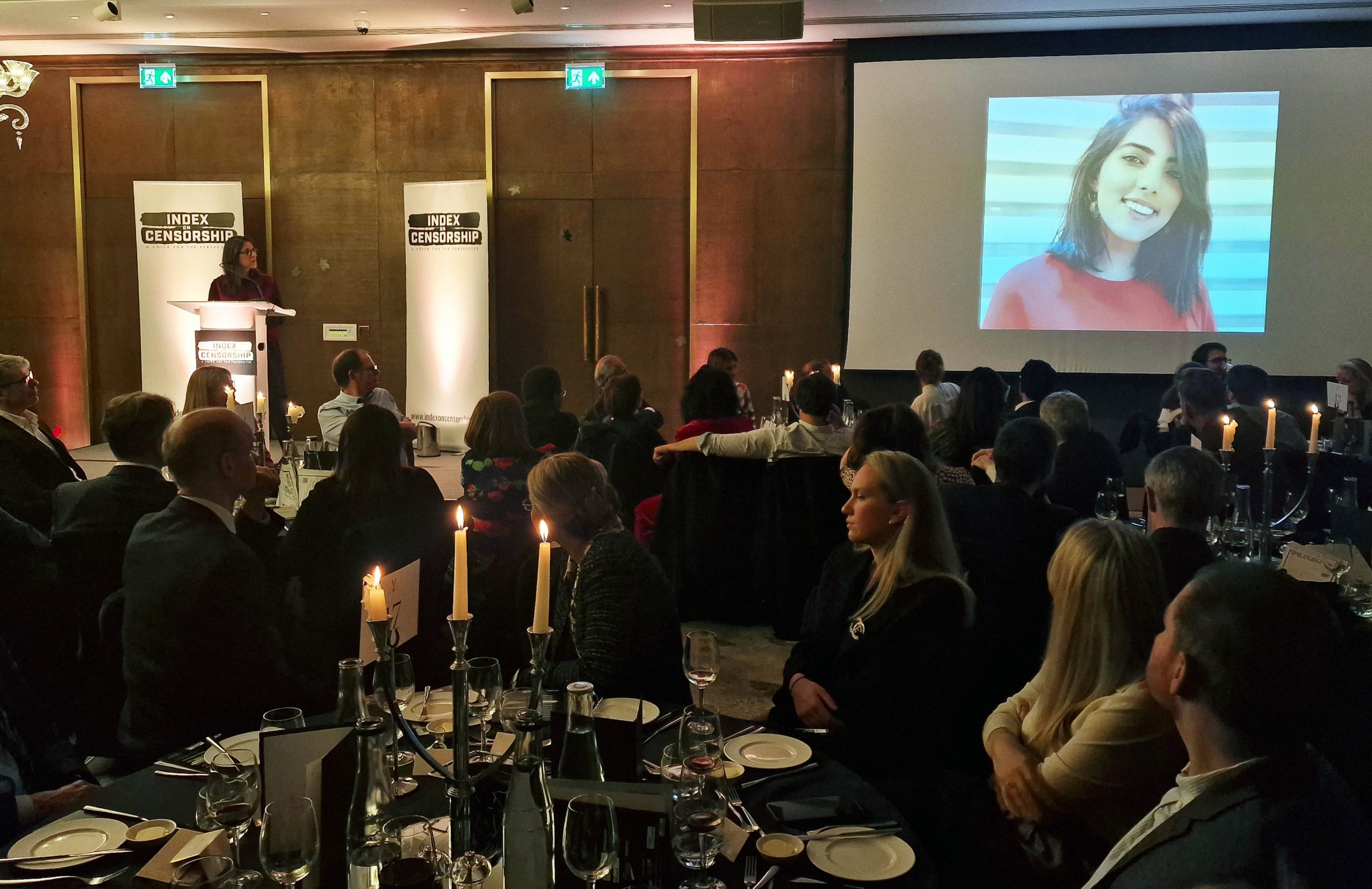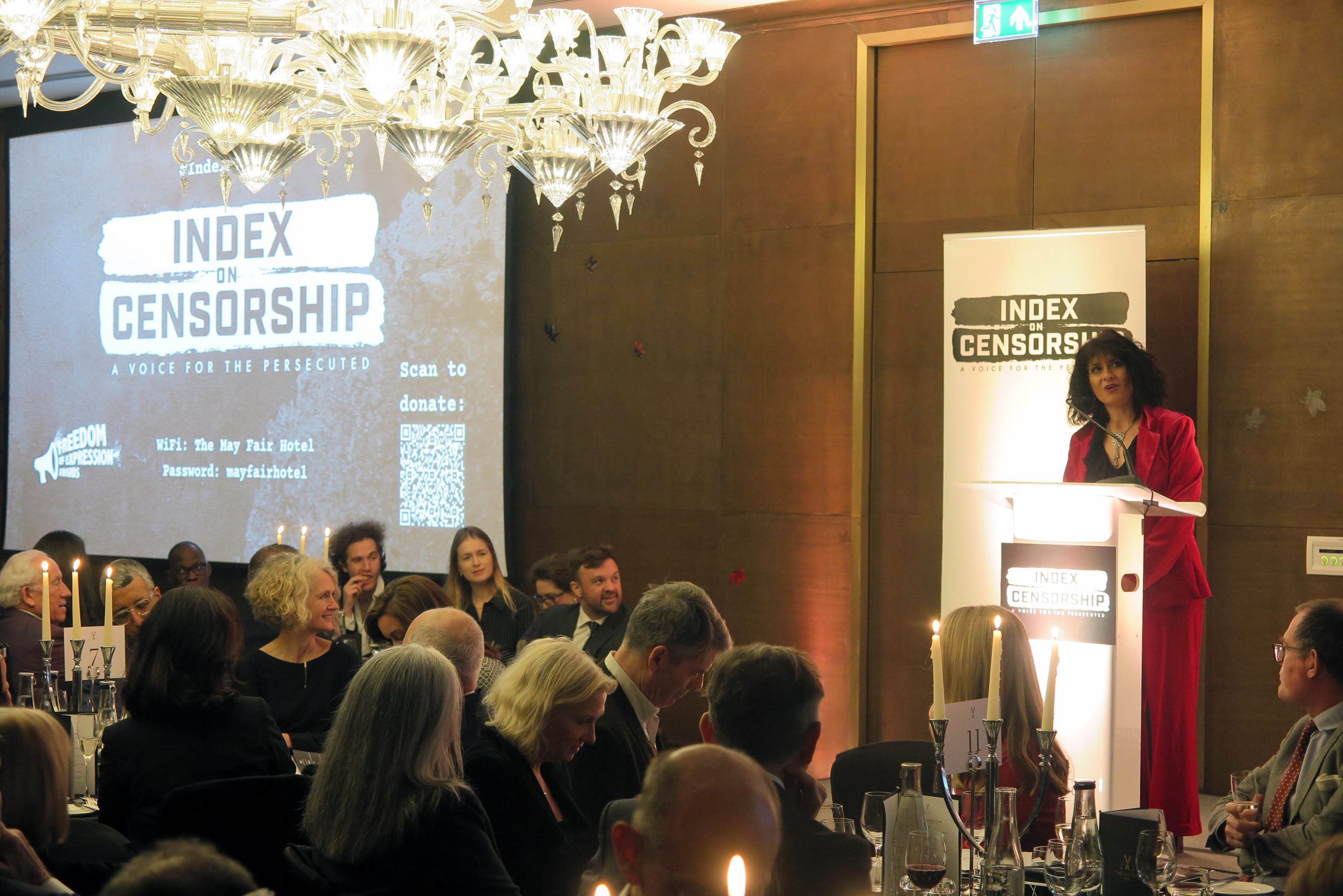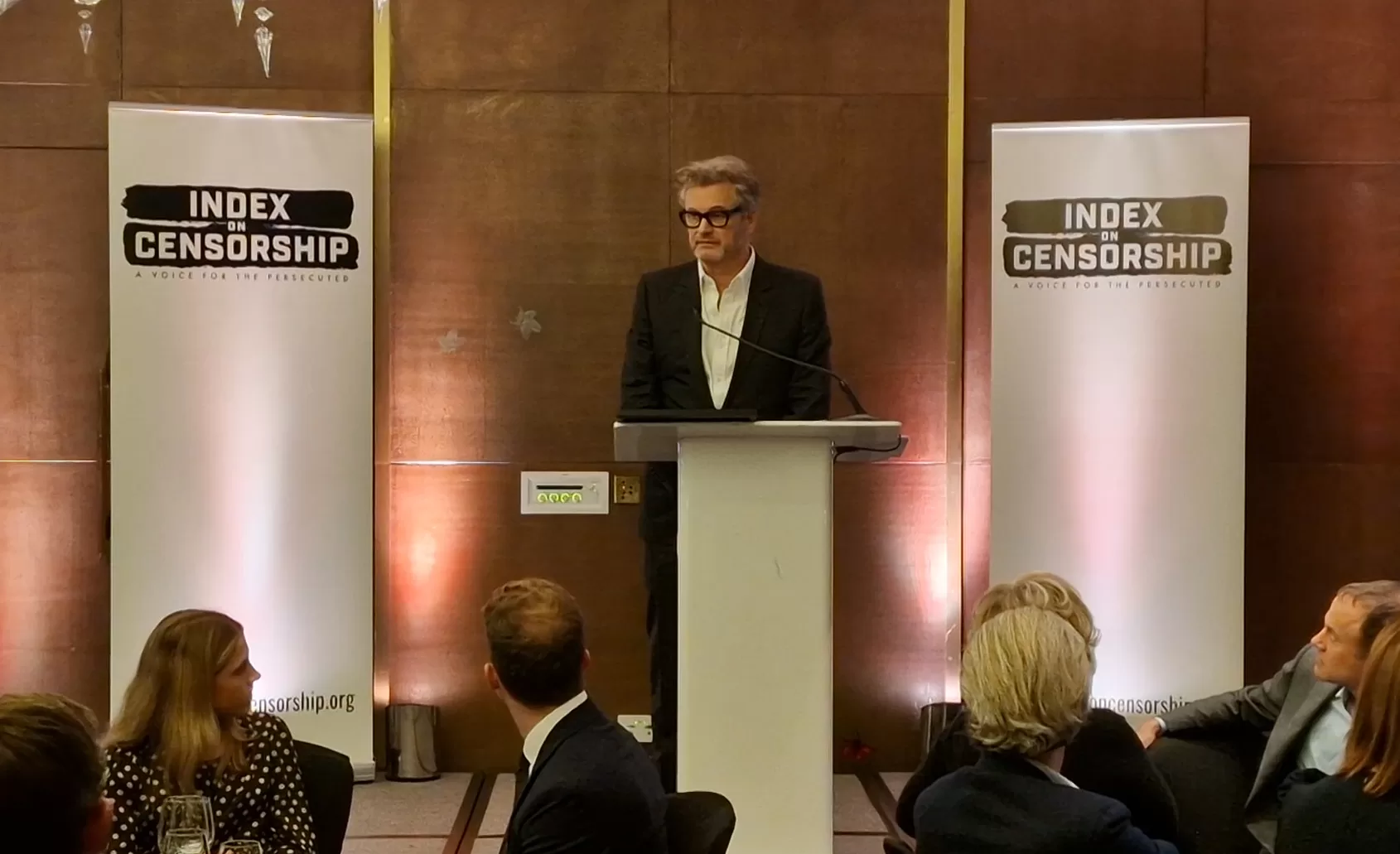[vc_row][vc_column][vc_video link=”https://youtu.be/Cc3K8Bcvt6Y”][vc_column_text]
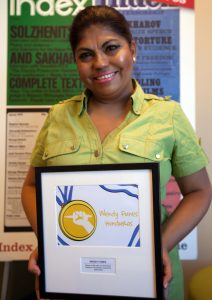
2018 Freedom of Expression Journalism Award-winning Honduran investigative journalist Wendy Funes. (Photo: Index on Censorship)
Wendy Funes is an investigative journalist from Honduras who regularly risks her life for her right to report on what is going on in the country. She is a courageous female voice, writing in a violent and corrupt society where two journalists have been killed this year and where women are regularly subjected to severe domestic violence and often killed. Funes is an inventive and passionate human rights reporter. For one article she got her own death certificate issued so that she could show up with the corruption in the civil registration office. For another one, they will be forced to fight for an investigation into children being forced to take to the streets of the country’s capital.
Looking out of one of the windows of my house a few days ago, while thinking about what to say this afternoon, I remembered the paradise tree in the garden which my childhood swing used to hang from. When it withered and died, I felt devastated. But now, forty years later, there are four big trees growing in its place and are all fruit-bearing.
For me, this award is so immense and significant that I can only explain it and express my thanks for it with a story that I have never told until now.
It is a story about a small fatherless child, yet another child left fatherless by the armed violence in Honduras. It is a story about a childhood filled with sadness. But the child learnt that whatever the circumstances, courage and strength are necessary to achieve one’s dreams: and the first step is always to dream.
In 2002 she began her first investigations as a journalist and it gave meaning to her life. But in 2008, censorship forced her to leave her dream job at the newspaper and by 2011 her constant fight for free expression and to tell the truth meant that all the doors to the media monopoly was closed to her.
But once again journalism saved her. She discovered that frustration with censorship is not the way. Rather, the way to overcome censorship is with the word, and although some doors were closed to her, doors to a more humane, less commercial, more rigorous kind of journalism were opened. The kind of journalism that investigates and pauses on each word, that does not proclaim impartiality but seeks the truth. The kind of journalism that is capable of showing her people that their society is being governed by drug trafficking and ruthless groups who since the 2009 coup have sacrificed lawyers, doctors, women, 70 journalists and executed young people in an almost invisible genocide.
The kind of journalism that can identify with a nation governed by someone who was rejected at the polls. Someone who controls the press that, in turn, covers up military assassinations, the corruption of officials and the everyday cruel realities for the Honduran people. Realities such as the 14-year-old girl sold by her father for a litre of alcohol whilst already pregnant, or the new-born baby who died of malnutrition and weighed more when he was born than when he died. In short, so many stories to tell. So many stories that the press is censored from telling.
But the young girl with whom this story began has been so fortunate that by refusing to remain silent and refusing to become part of this cruel system, by telling stories that a journalist should tell, she is being shown once again that the courage to dream is well-rewarded. That there is always someone willing to extend their hand and say “Come on, it’s worth resisting, it’s worth dreaming and fighting to transform all of this pain into a reward.” A reward which gives me hope.
I dedicate this prize to my fellow people of Honduras who demonstrate every day that they wish to move forward and overcome the violence, impunity and corruption which have been afflicting us for more than three decades.[/vc_column_text][/vc_column][/vc_row][vc_row disable_element=”yes”][vc_column width=”1/2″][vc_single_image image=”84882″ img_size=”full” alignment=”center”][vc_column_text]
Speech: Ildar Dadin: “Together, we can refuse to look away”
Profile: #IndexAwards2017: Ildar Dadin courageously defends the right to protest in Russia
For his one-man protests, Ildar Dadin was sent to prison in December 2015 where he was tortured, before his conviction was quashed in February 2017. Read the full profile.[/vc_column_text][/vc_column][vc_column width=”1/2″][vc_single_image image=”84888″ img_size=”full” alignment=”center”][vc_column_text]
Speech: Rebel Pepper: “I will continue working hard on creating new cartoons”
Profile: #IndexAwards 2017: Chinese cartoonist Rebel Pepper refuses to put down his pen
Despite the persecution he faces for his work, Rebel Pepper continues to satirise the Chinese state from a life in exile in Japan. Read the full profile
[/vc_column_text][/vc_column][/vc_row][vc_row disable_element=”yes”][vc_column width=”1/2″][vc_single_image image=”84889″ img_size=”full” alignment=”center”][vc_column_text]
Speech: Alp Toker, Turkey Blocks: “Online censorship is increasingly used to mask more severe human rights violations”
Profile: #IndexAwards2017: Turkey Blocks strives to win back the internet
Established in 2015, Turkey Blocks is an independent digital research organisation that monitors internet access restrictions in Turkey. Read the full profile.
[/vc_column_text][/vc_column][vc_column width=”1/2″][vc_single_image image=”84887″ img_size=”full” alignment=”center”][vc_column_text]
Speech: Zaheena Rasheed, Maldives Independent: “This award feels like a lifeline”
Profile: #IndexAwards2017: Maldives Independent continues to hold government to account despite pressures
Maldives Independent, the Maldives’ premiere English publication and one of the few remaining independent media outlets, was formed in exile in Sri Lanka in 2004. Read the full profile.
[/vc_column_text][/vc_column][/vc_row][vc_row][vc_column][vc_column_text]Mirando por una de las ventanas de mi casa, un par de días atrás, mientras pensaba en qué decir esta tarde, me acordé del árbol de Paraíso del jardín, desde el cual colgaba el columpio de mi niñez. Cuando se marchitó y se murió, me sentí desconsolada. Sin embargo ahora, unos treinta años después, ahí hay cuatro árboles grandes creciendo en su lugar y todos rinden fruta.
Para mí, este premio es tan inmenso e importante que solo puedo explicar y expresar mi agradecimiento con un cuento que, hasta ahora, nunca he relatado.
Es un cuento de una niña chiquita sin padre. Otro niño más dejado sin padre por la violencia armada en Honduras. Es un cuento de una niñez llena de tristeza. Pero la niña aprendió que en toda circunstancia, la alegría, el coraje y la fuerza son necesarios para lograr sus sueños: y el primer paso siempre es soñar.
En 2002 ella empezó sus primeras investigaciones como periodista y eso le dió un significado a su vida. Pero en 2008, la censura la obligó a dejar el trabajo de sus sueños en el periódico y en 2011, su constante lucha por la libertad de expresión y de exponer la verdad, significó que todas las puertas del monopolio le fueron cerradas.
Pero una vez más, el periodismo la salvó. Ella descubrió que luchar contra la censura, no era el mejor método. Más bien, el mejor método de combatir la censura era a través de la palabra, y a pesar de que algunas puertas le fueron cerradas, se le abrieron otras a otro tipo de periodismo más humano, menos comercial y más riguroso. El tipo de periodismo que investigaba y que hacía una pausa en cada palabra, el que no proclamaba la imparcialidad pero que buscaba la verdad. El tipo de periodismo capaz de enseñar a su pueblo que la sociedad está siendo gobernada por el tráfico de drogas y grupos despiadados, quienes, desde el golpe de Estado del 2009, han sacrificado a abogados, médicos, mujeres, unos setenta periodistas y han ejecutado a jóvenes en un casi invisible genocidio.
El tipo de periodismo que puede identificarse con una nación gobernada por una persona que fue rechazada en las elecciones. Una persona que controla la prensa, y que por ende encubre asesinatos, la corrupción de los oficiales y las crueles realidades cotidianas que sufre el pueblo de Honduras. Realidades tales como la muchacha de catorce años vendida por su padre por un litro de alcohol y mientras estaba embarazada, o el infante recién nacido que murió por la malnutrición y cuyo cuerpo pesaba más cuando nació que cuando murió.
Pero la jóven muchacha con quien empezó este cuento, ha sido tan afortunada que, por negarse a mantenerse callada y por negarse a ser parte de este cruel sistema, por contar cuentos que un periodista debería contar, está comprobando una vez más que el coraje de soñar está bien recompensado. En resumidas cuentas, hay tantos cuentos que contar. Tantos cuentos que la prensa está censurada de contar. Que siempre haya alguien que esté dispuesto a extender la mano y decir, Vamos, vale la pena resistir, vale la pena soñar y luchar para transformar todo este dolor en una recompensa>. Una recompensa que me da esperanza.
Dedico este premio a mis compatriotas de Honduras porque ellos demuestran todos los días, el deseo de salir adelante y vencer la violencia, impunidad y corrupción que nos han estado afligiendo con mayor calamidad en las últimas tres décadas.[/vc_column_text][/vc_column][/vc_row][vc_row][vc_column][vc_basic_grid post_type=”post” max_items=”12″ style=”load-more” items_per_page=”4″ element_width=”6″ grid_id=”vc_gid:1524235559634-0014c057-81cc-3″ taxonomies=”8935″][/vc_column][/vc_row]

